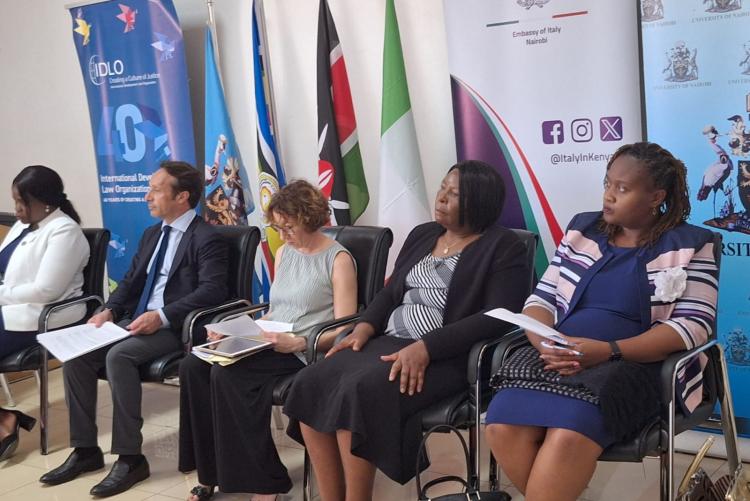The Faculty of Law at the University of Nairobi, in collaboration with the Italian Embassy in Nairobi, hosted a Round Table discussion on Thursday, 21st March 2024, focusing on legal frameworks to combat Gender-Based and Domestic Violence. The event aimed to facilitate an exchange of perspectives between Italian and Kenyan legislation, drawing attention to similarities, differences, and challenges in implementation in both countries.
The discussion commenced with Hon. Roberto Natali, the Ambassador of Italy to Kenya, emphasizing that while legislative interventions like Italy's Red Code Law and Kenya's Sexual Offences Act are crucial steps, they alone are insufficient to address the deeply rooted issues of gender-based and domestic violence. Natali stressed the necessity of cultural transformation, education, and collaboration between genders to promote equality and prevent violence. He underscored that tensions within families, exacerbated by events such as the COVID-19 pandemic, can contribute to increased violence. Natali advocated for a holistic approach beyond legislation, urging society to work together towards a future free from gender-based discrimination and violence.
Representing the Dean of the Faculty of Law, Dr. Nkatha Kabiria highlighted the institution's commitment to addressing gender-based violence through its curriculum and comprehensive study programs. By reflecting on the experiences of Kenya and Italy, the event aimed to identify innovative strategies and empower students to advocate for transformative change. Dr. Kabiria noted the university's robust gender policy, including measures to eradicate sexual harassment, provide support services, enforce strict rules, and treat sexual offenses as crimes.
Keynote speakers, Hon. Justice Mr. Michele Fini and Dr. Raffaello Calo from the Ministry of Justice, Italy, shed light on Italy's "Codice Rosso" or "Red Code" law. Enacted in 2019, this law introduced a comprehensive set of measures to combat gender-based and domestic violence. It prioritized cases of abuse, stalking, and violence against women and children, imposing stricter penalties for perpetrators and expanding the legal definition of domestic violence. Innovative measures such as a national helpline and a code of conduct for public officials aimed to raise awareness and sensitivity towards victims, marking a significant step forward in Italy's approach to prevention, protection, and prosecution.
Former Deputy Chief Justice of Kenya, Hon. Dr. Nancy Baraza, highlighted Kenya's progress in strengthening its legal framework to address gender-based violence. Despite significant legislative achievements such as the Protection from Domestic Violence Act and the Sexual Offences Act, challenges persist in implementation. Concerns include controversies over consent and mandatory minimum sentences, indicating a disconnect between legislation and practical realities. Hon. Dr. Baraza emphasized the need for a holistic approach addressing root causes and aligning provisions with international standards and principles.
In conclusion, the Round Table discussion provided valuable insights into legal frameworks to combat gender-based violence, showcasing experiences from Kenya and Italy. While legislative interventions are crucial, a holistic approach encompassing cultural transformation, education, and collaboration is essential for meaningful change. By working together, societies can create a future where gender-based violence is firmly condemned, and every individual's rights and dignity are upheld.

